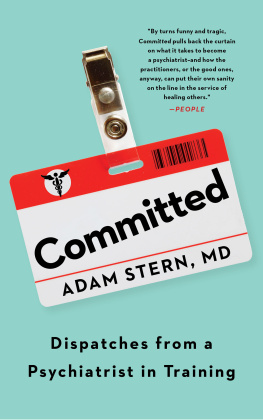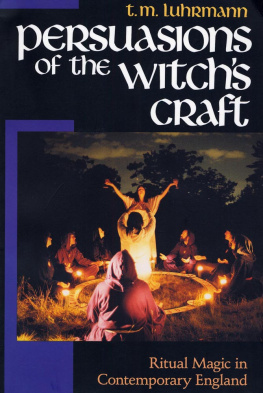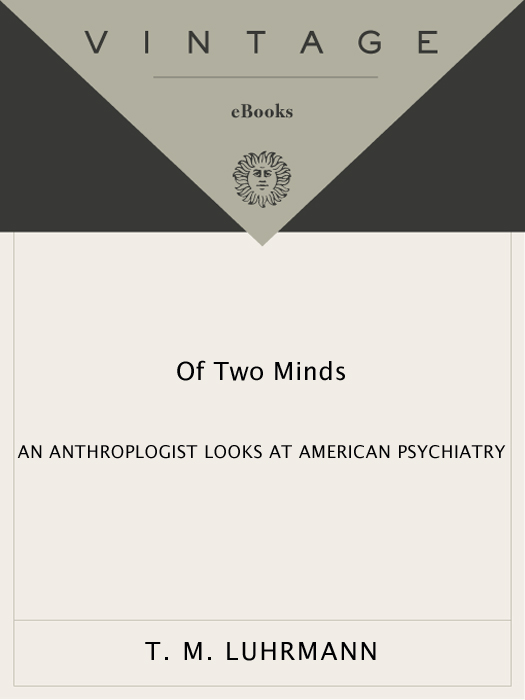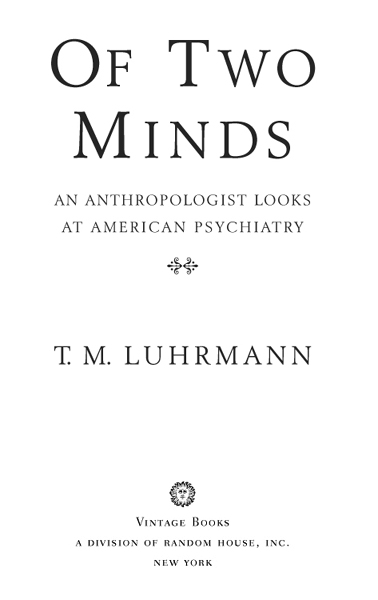ACCLAIM FOR T. M. LUHRMANNS
OF TWO MINDS
That rarest of achievementsa brilliant contribution to scholarship, an important document for policy, a compulsive read.
Howard Gardner, author of
The Disciplined Mind and Intelligence Reframed
Of Two Minds needs to be read by every psychiatrist, and every psychiatric resident, and by psychologists, social workers, nurses, and laypeople who possess an interest in psychiatry, because it is the single best account of what is happening to psychiatry. Beautifully written. A triumph!
Arthur Kleinman, M.D., Professor of Anthropology and Psychiatry,
Harvard University
An important book, shedding light on the world of psychotherapy as only a caring outsider would do.
Harold Kushner, author of
When Bad Things Happen to Good People
Written with verve, Of Two Minds is a tour de force of careful, empathetic scholarship that deserves the widest of audiences.
Austin American-Statesman
A spirited, clear-eyed visit to the land of American psychiatry, where the insurance industry drones and the drug-cowboys of psychopharmacology are taking over. This terrific book urges us to preserve what truly heals: a shared journey of mutual, compassionate connection.
Samuel Shem, M.D., Ph.D., psychiatrist at Harvard Medical School,
and author of The House of God and Mount Misery
One of the most important studies of society and mental health over the past three decades, Of Two Minds is destined to become a classic. It is must reading for everyone concerned with the study and treatment of personal distress.
Bertram J. Cohler, William Rainey Harper Professor
of Social Sciences, University of Chicago
Scrupulously fair Of Two Minds is the best book on mental illness and its treatment that I have read since The Powers of Psychiatry by Jonas Robitscher. Issues of morality and responsibilityon the part of psychiatrists, of society and of the mentally ill themselvespermeate her discussion.
Carol Tavris, The Times Literary Supplement
Riveting. Readers will turn the last page of this book feeling that they have been given a rich, generous, behind-the-scenes look at a profession that is intrinsically fascinating and that may affect them at some crucial point in their own lives.
The Womens Review of Books

T. M. LUHRMANN
OF TWO MINDS
T. M. Luhrmann is Professor in the Committee on Social Thought at the University of Chicago. She lives in Chicago.
ALSO BY T. M. LUHRMANN
Persuasions of the Witchs Craft
The Good Parsi
FIRST VINTAGE BOOKS EDITION, AUGUST 2001
Copyright 2000 by T. M. Luhrmann
All rights reserved under International and Pan-American Copyright Conventions. Published in the United States by Vintage Books, a division of Random House, Inc., New York, and simultaneously in Canada by Random House of Canada Limited, Toronto. Originally published in hardcover in the United States by Alfred A. Knopf, a division of Random House, Inc., New York, in 2000.
Vintage and colophon are registered trademarks of Random House, Inc.
The Library of Congress has cataloged the Knopf edition as follows:
Luhrmann, T. M. (Tanya M.), [date]
Of two minds : the growing disorder in American psychiatry / T. M. Luhrmann.
p. cm.
eISBN: 978-0-307-79190-0
PsychiatryStudy and teaching. 2. Psychiatry. I. Title.
RC336.L78 2000
616.890071173dc21
99-40732
Author photograph by Elena Siebert
www.vintagebooks.com
v3.1
For my father
I would like to thank my wife, Sally. Along those linesThanks respectively to Wyeth/Ayerst Laboratories and Stuart Pharmaceuticals for further expanding that narrow channel of joy by manufacturing Effexor and Elavil; drugs so good they feel illegal.
Thom Jones, Cold Snap
Trying to understand experiences that are at once personal and cultural calls for a kind of passionate detachment that is, I think, almost impossible to sustain alone. Susan Robertson, my psychotherapist, has been a constant source of emotional support and thoughtful analysis.
Kathryn Dudley, The End of the Line
CONTENTS
AUTHORS NOTE
This ethnographic material has been taken from hundreds of hours of tape recording, note taking, and more casual conversation. In the interest of anonymity, the names of people interviewed have been changed (except for some whose work, by its visible nature, removes their anonymity). In the interests of coherence, some quotations have been edited for flow, although content has been preserved. And in the interests of both narration and anonymity, some individuals, while loosely based on real people, are intended to be composite figures, and some quotations by other people have been attributed to them. The story of Gertrude, for example, is a composite of events in the lives of three different women. All the events, it should be said, happened in the manner described, and all the details and quotations are accurate within the limits of anthropological note taking, although identifying details have been omitted or changed. Some quotations are based on taped conversations. Others are based on field notes taken after the encounter and often recorded in the third person.

I NTRODUCTION
In the autumn of 1989, I arrived as a new assistant professor in an anthropology department known for its long tradition of psychological anthropology. I was already an experienced ethnographer, with a book on modern witchcraft behind me and another on Zoroastrianism under way. But I was a relative newcomer to psychological anthropology, at least in its American form (I had done my training in England), and my colleagues suggested that it might be helpful for me to attend the lectures to the new psychiatrists in training.
American psychological anthropology grew out of a tradition of using psychoanalytic ideas to make sense of cultural practices. (My background was more cognitive.) Margaret Mead was one of its founding mothers. She used a loosely Freudian understanding of childhood experience in different societies to explain their adult behavior. So for years, graduate students in my department had been sent to learn a clinical perspective on Freud and psychoanalysis from the lectures given to young psychiatrists. As it happened, they had long been complaining that the lectures had nothing to do with anthropology, but I didnt know that at the time. I just showed up, with a mixture of excitement and trepidation, in a year when no graduate students came along.
I told myself that the lectures would not be entirely unfamiliar territory: my father is a psychiatrist, and I myself had seriously considered becoming one, settling on anthropology because I saw myself more as a writer of books than as a healer of patients. As one of my colleagues points out, this makes me a halfie anthropologist, someone who grew up half in the world she writes about professionally, like an anthropologist with an Egyptian father who goes off to live with the Bedouin. There are a number of halfie anthropologists these days. Being one gives you a little edge, because you grew up speaking the language of the world you later describe.











